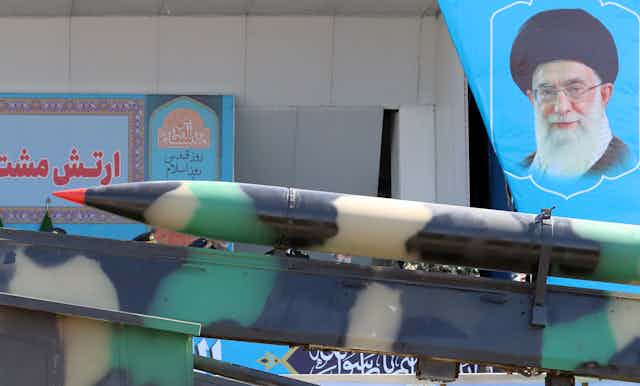Numerous attempts by Houthi rebels to attack and disrupt cargo shipping in the Red Sea have been met by airstrikes by the UK and US on Houthi-controlled areas in Yemen – including the capital Sana'a. The intervention represents a significant level of escalation in the Middle East and is indicative of just how volatile the region has become.
While the Houthis claim their attacks are in retaliation for Israel’s war against Hamas, it’s actually more complicated. Iran’s backing of the Houthis looks like part of a plan by Tehran to draw the west into a protracted Middle Eastern conflict in order to sow regional discord and further its plans for hegemony.
Over the recent years, Iran has consistently demonstrated its disruptive ability. It has done this despite the best efforts of the west (and Israel) to deter its aggression and contain its influence. The latest episode is another sign of how badly the west has failed in this.
A succession of tough sanctions packages and targeted drone strikes on Iranian commanders has not prevented Tehran from pursuing its foreign policy ends, despite ongoing domestic unrest which some analysts predicted might unsettle or even topple Iran’s clerical regime.
As well as funding and training the Houthis in their campaign to control Yemen and disrupt Red Sea trade, reports suggest Iran’s Islamic Revolutionary Guard Corps has proven to be highly competent in coordinating Hamas and Hezbollah in their attacks on Israel. It has also been a key ally for Russia during its war in Ukraine, providing a supply of Shahed drones which have helped Vladimir Putin maintain pressure on Kyiv with regular barrages of attacks on power infrastructure over the two years of the conflict.
Revisionist state
In short, Iran is a revisionist state – it wants to change the regional order – and its belligerent behaviour is likely to continue. Now the larger (and recurring) problem the west must address is how to prevent Iran from developing a nuclear capability. This would undoubtedly embolden the regime’s actions. A nuclear-armed Iran would arguably represent the greatest threat to Israel’s national security and the international liberal order.
Barak Obama’s administration assumed that Iranian hostility could be mitigated by providing economic incentives in return for assurances that uranium enrichment levels would be curtailed by Tehran. This culminated in the nuclear deal signed in 2015 between Iran, the P5+1 (the permanent members of the United Nations Security Council – plus Germany) and the European Union.
Read more: What the Iran nuclear deal means – and what it doesn't
That deal is all but extinct. Donald Trump signalled its death knell when he withdrew the US from the agreement in 2018. Efforts by the Biden administration to resurrect the agreement have yet to bear fruit. At present this would appear to be a long way off, given the collapse in relations between Iran and the west.
Empire, Islam and revolution
In any case, the whole approach did not appreciate the internal social structures driving Iranian foreign policy. The country’s behaviour is shaped by its history and identity as a former imperial power. This is something Britain and west should pay attention to.
Much of Iran’s national identity constitutes a mixture of revolutionary fervour, Shia Islam and a form of nationalism focused around Iran’s pre-Islamic history, notably the Persian empire during the Achaemenid dynasty (550-330 BC).
Meanwhile, power resides with individuals – such as supreme leader Ali Khamenei – who were influential in Iran’s revolutionary period (1979). This was a time in which religiously guided militant action was the primary course of action to redress political grievances.

As a former imperial power and a country that experienced revolution, Iran presumes that it has the natural right to intervene in other country’s affairs. Tehran’s interventionist stance is guided by a religious sense of duty. It takes on the role as protector and provider of honour for the Shia Islamic world, which has in part driven its competitive rivalry with Saudi Arabia.
Conversely, Iran’s foreign policy discourse is informed by its view of the west as inherently devious and imperialist. This national narrative, as a state under perennial attack from the west, selectively draws on its experience of imperial clashes with the Russian empire in the 19th century and with Britain and US over the 1953 coup d’etat which toppled the elected prime minister Mohammad Mosaddegh, to restore the Shah. The coup is thought to have fostered the conditions for the 1979 revolution.
I believe these two factors are the primary drivers of Iranian belligerence and adventurism. The country’s resilience in the face of western sanctions – in part now eased by trade with Russia and China – should remind us that Iran is not a state which will easily abandon its regional ambitions. Even though UK defence secretary Grant Shapps has asked Iran to control its proxies, it will not suddenly stop funding terrorism in the Middle East because Britain asks it to.
No nukes
If Iran was to acquire a nuclear capability, that does not mean that it would use it. But it would stiffen Tehran’s resolve to continue its current dangerous behaviour. It would fundamentally disrupt the balance of power in the region and could lead to a spiralling arms race with Saudi Arabia.
So the UK’s main foreign policy in the Middle East must be to prevent Iran from developing a nuclear arsenal. Until now, Britain has been averse to deploying coercive measures to deter Iran. The current situation calls for this posture to be revisited. I would argue the UK’s strategy towards Iran should be unambiguous, with clear red lines.
Building coalitions with regional partners will be key to this. The current UK government understandably does not want to escalate tensions and it may want to pursue a risk-free policy in the region. But, increasingly, that option may no longer be available.

